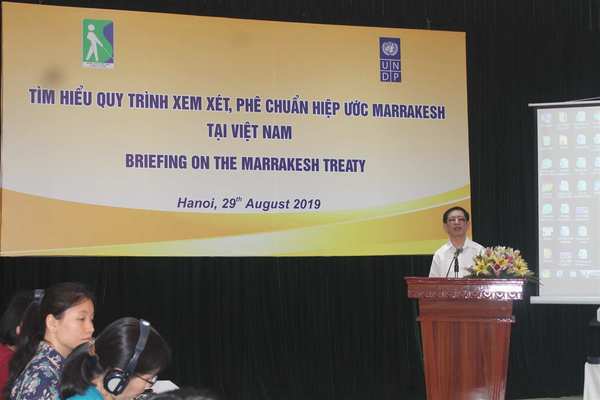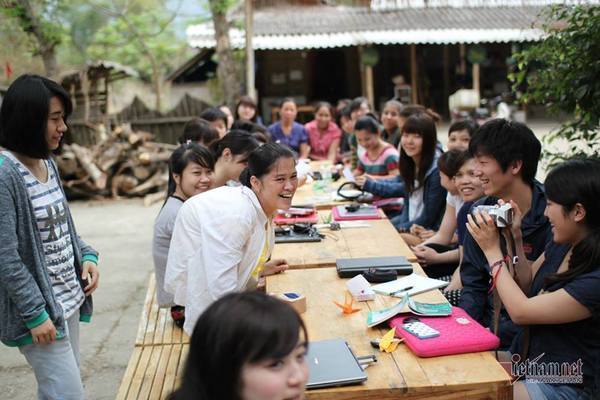 |
|
The seminar on the Marrakesh Treaty was recently held in Hanoi.
|
Recently, at the signing ceremony of a joint program between the Ministry of Culture, Sports and Tourism and the Central Committee of the Vietnam Blind Association, Chairman of the Vietnam Blind Association Pham Viet Thu said the program is meaningful and practical to develop reading habits, needs, skills and movements among the blind.
Thu also called for promotion of lifelong learning services for the blind; improvement of reading environment, increase of document resources and services for the blind as these activities will contribute to improving the intellectual level, developing thinking, creativity, fostering personality, soul, forming a healthy lifestyle, serving the lifelong learning needs of the blind.
Access to knowledge is a human right. This is a prerequisite for the people to develop fully and comprehensively as it opens the door to education, employment opportunities, health improvement and participation in social, cultural, and political activities. However, due to the lack of books that are published in accessible formats, nearly 300 million people worldwide are severely limited in their right to knowledge. They are people who are blind, have poor vision or those who have difficulty in reading because of physical or learning disabilities. Around 90% of "people unable to read print publications" currently live in developing countries. Vietnam has 1.03 million hearing impaired and 0.93 million listening impaired people.
Unreasonable, timely and rational access to written knowledge makes the challenges and violations of rights facing people with disabilities more serious and long-lasting. This hinders global efforts in inclusive, equitable and sustainable development. The Marrakesh Treaty on enabling the visually impaired and the other disabled without access to published works was signed in 2013 and took effect in 2016. The Marrakesh Treaty opens a legal environment to improve access to published works for people who cannot read print works, creating a fair balance between copyright protection and common interest protection.
 |
|
Improving access to information for people with disabilities is the key contents of the Marrakesh Treaty.
|
The Copyright Office of Vietnam and the World Intellectual Property Organization (WIPO) jointly held a seminar on the Marrakesh Treaty on creating conditions for visually impaired and blind people and other disabilities to have access to published works in Hanoi.
At the seminoar, the participants listened to and discussed the basic contents of the Marrakesh Treaty; the reality of reading resources for visually impaired and other disabled people who cannot read in Vietnam; projects on access to books for the blind (ABC) and the legal system, the management and enforcement of copyright and related rights in Vietnam.
According to Ms. Dinh Viet Anh, Vice Chair of the Vietnam Blind Association, access to information and documents of the disabled people who cannot read still faces many difficulties. The number of books and documents that have been converted and produced in accessible format is still very limited. The primary textbooks in Braille only meets 50% of the demand, and the rates are much lower for the textbooks in Braille for secondary and high school students.
Visually impaired college and postgraduate students always have to face with the lack of textbooks and learning materials. The percentage of other documents converted in suitable formats for the blind is very small compared to the treasure of published works. Therefore, if the legal basis for access to information and documents for people with disabilities is improved and effectively implemented, it will create opportunities for the blind to have better conditions to improve their knowledge, skills, and to harmonize with the general development of society.
According to Ms. Dinh Viet Anh, the ratification and implementation of the Marrakesh Treaty will contribute to promoting the implementation of the CRPD and SDG in improving access to information and knowledge, which are essential elements for people with disabilities to improve their knowledge, raise skills, have more employment opportunity, increase their income and reduce poverty. The hunger and poverty rate among members of the Vietnam Blind Association is very high, at 19.14% of the total 74,430 members, which is 3 times higher than the national poverty rate (5.8%).
Viet Chung
 Access to knowledge is an important right and a prerequisite for the people to develop fully and comprehensively.
Access to knowledge is an important right and a prerequisite for the people to develop fully and comprehensively.